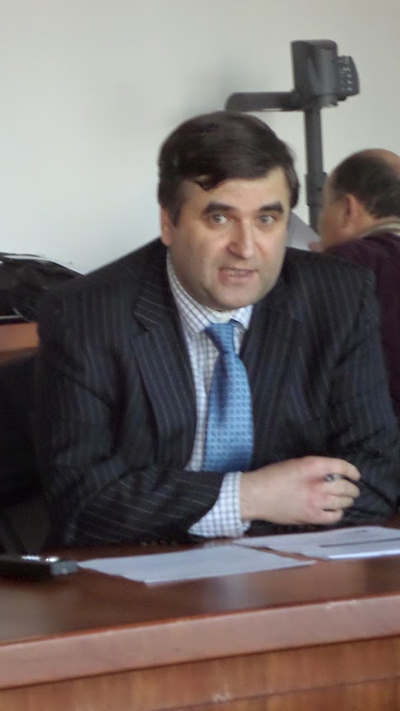Honest, paywall-free news is rare. Please support our boldly independent journalism with a donation of any size.
Canadian academics discussed the origin of the current crisis and civil war in Eastern Ukraine and the larger geopolitical context of the Ukrainian crisis. They concluded that the reconciliation in Ukraine, if it ever happens, will be a very difficult and long process.
A very informative half-day conference on the current situation in Ukraine took place at the University of Ottawa on December 4, 2014. It was an occasion for the academic community and the public at large to analyze and discuss the origin of the current crisis and civil war in Eastern Ukraine and the larger geopolitical context of the Ukrainian crisis, involving the West and Russia.
The conference was titled “United Ukraine? The Euromaidan revolution and the Donbas rebellion in domestic and international perspectives.” It was initiated and organized by Halyna Mokrushyna, part-timeprofessor of sociology at the University of Ottawa, with the support of the Graduate School of Public and International Affairs and The Sociology and Anthropology Graduate Students Association of the University of Ottawa.
The first panel of the conference, “Two Ukraines,” featured presentations by three Canadian scholars of Ukrainian origin – Ivan Katchanovski, Olga Ostriichuk, and Halyna Mokrushyna.
Ivan Katchanovski
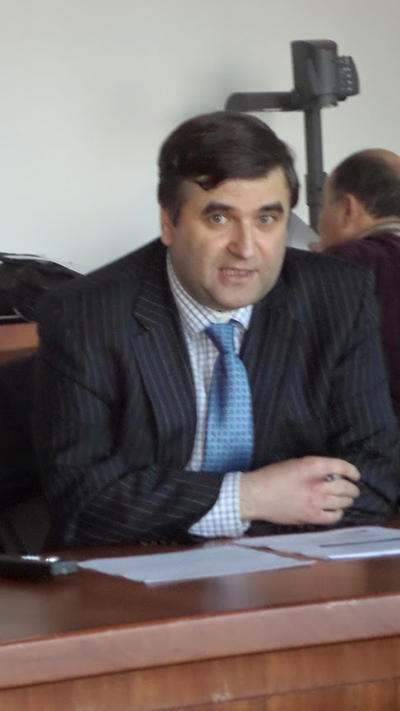 Ivan Katchanovski. (Photo: Nadia Volguine)Katchanovski is a professor at the School of Political Studies and Communication Department at the University of Ottawa. He presented his research paper that was published earlier this year, “East or West? Regional Political Divisions in Ukraine since the “Orange Revolution” and the “Euromaidan.” He has been researching the regional division in Ukraine for many years. He is the author of “Cleft Countries: Regional Political Divisions and Cultures in Post-Soviet Ukraine and Moldova” and of many articles in academicjournals.
Ivan Katchanovski. (Photo: Nadia Volguine)Katchanovski is a professor at the School of Political Studies and Communication Department at the University of Ottawa. He presented his research paper that was published earlier this year, “East or West? Regional Political Divisions in Ukraine since the “Orange Revolution” and the “Euromaidan.” He has been researching the regional division in Ukraine for many years. He is the author of “Cleft Countries: Regional Political Divisions and Cultures in Post-Soviet Ukraine and Moldova” and of many articles in academicjournals.
In his presentation at the conference, Katchanovski analyzed the changes in regional electoral behavior and attitudes towards foreign policy orientation in Ukraine after the “Orange Revolution” in 2004 and the “Euromaidan” in 2014. More specifically, he looked into the support of political parties and presidential candidates in different regions of Ukraine during these past ten years. Significant regional differences remained throughout this period of time, with the support of pro-Westernand nationalist parties growing in all regions of Ukraine while the support of pro-Russian and pro-communist parties has declined. In the parliamentary election of October 2014, we saw a much stronger support for pro-Western parties in CentralUkraine, and a significant but much weaker support of the Pro-Russian and pro-communist parties in Eastern and Southern Ukraine. The same pattern occurred during the presidential election in May of this year, even though both elections were not held in the most populated parts of Donbas, which were controlled by pro-Russian separatists.
Regarding the Ukraine’s potential membership in the NATO military alliance, there has been an increase of support in Western and Central Ukraine in April 2014, but a small support in Eastern and SouthernUkraine.
Concerning relations with Russia, significant regional differences are observed too: after Euromaidan, there was significant decline in support of reunification of Ukraine with Russia even in Eastern Ukraine. Most people support an independent Ukraine without customs and without visas with Russia.
Katchanovski commissioned a public survey in Ukraine by Kyiv International Institute of Sociology in April and May in order to determine support for political autonomy or secession in different regions ofUkraine. The data show that there was no significant support for secession in most regions of Ukraine. But in the Donbas region (Southeast Ukraine), this support was strong. It increased significantly after theEuromaidan. A civil war in Donbas by pro-Russian and Russian-backed separatists and the Russian military interventions in Crimea and Donbas in support of separatists signified a de facto break up of Ukraine, with pro-Russian separatists holding power in Donbas.
Olga Ostriichuk
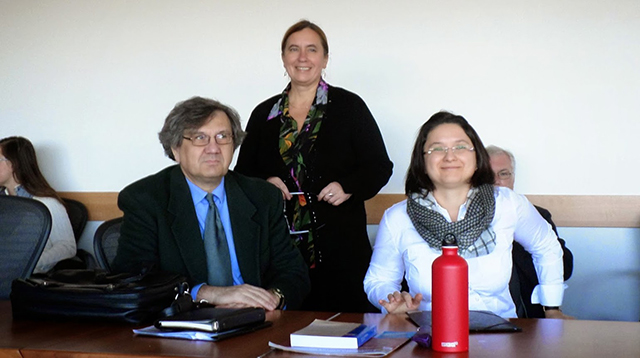 Center: Halyna Mokrushyna; Right – Olga Ostriichuk. (Photo: Nadia Volguine)
Center: Halyna Mokrushyna; Right – Olga Ostriichuk. (Photo: Nadia Volguine)
Olga Ostriichuk, an independent researcher, has studied the division of Ukraine in collective memory and the interpretation of the past. Last year, she authored a book in French, “Les Ukrainiens face à leur passé” (Ukrainians Face Their Past) with Peter Lang Publishing (Brussels) which looks into the social fracture of Western and Eastern Ukraine, based on diverging narratives of the history of the country and interpretation of key elements of the Ukrainian national identity – the poet Shevchenko, the Holodomor (Great Famine of 1932-33), and the catastrophy of World War Two from 1941-1945. Ostriichuk’s talk was titled “‘L’Ukraineau-dessus de tou’t: le rôle de l’extrême-droite dans la reconquista nationale” (“Ukraine above all’ – the role of extreme right in the national reconquest”) She reflected on how the nationalist parties conquered not only the physical space of the Euromaidan, but also the minds of people. In this mental reconquest, a post-Soviet mentality was replaced by a mentality of heightened nationalism.
For those who wanted to hear and see, it was clear that the demands of the Maidan were formulated and supported, above all, by people from Western Ukraine. There was a great deal of logistical support and car-pooling to feed the contestations on Maidan Square in Kyiv, including the occupation of governmental buildings on Maidan from the start, in December, when there was no violence on Maidan. Nationalist slogans, such as “Ukraine above all,” were shouted on Maidan all throughout, so much so that they became trivial. Nationalist themes were recreated on Maidan with symbols, folk costumes, slogans, a strong presence of nationalist flags, especially those of the Organization of Ukrainian Nationalists. All these veryquickly replaced symbols of the European Union. All of this led to the radicalization of Maidan and of the Ukrainian society at large.
This nationalist radicalization has been a gradual process, culminating with the emergence of “Svoboda,” an extreme-right party. It began to rise in 2004-2006, capitalizing on grievances and quarrels within the pro-western, “Orange” camp. The party gained important support not only in its stronghold – Western Ukraine – but also in Central Ukraine and in Kyiv. This success on the national level is due to a great extent to the involvement of Svoboda in identity and memory politics. Svoboda is involved very much in destroying and transforming symbols of the Communist past and constructing new, nationalist monuments. It has supported monuments to the Heroes of the “Celestial Hundred” (the victims of political violence in Maidan Square in January and February 2014) and people who died in this year’s war in Eastern Ukraine. Today, there are many events which mobilize the nationalist memory and the propagation of nationalist ideas – folk festivals, commemorations, commemorative services, archeology, public posters, as well as more direct measures such as pressuring voters.
Nationalism, coupled with religious fervor and mobilization of memory, becomes murderous and violent. Without the hyper activism of Ukrainians from the West on Maidan Square and without the support of the Ukrainian Diaspora in North America, the processes we observe today would not have been possible. Society would not have been able to mobilize to such an extent, to change to such an extent. Given the scale of crisis, the process of reconciliation and healing of this society will be particularly long anddifficult, Ostriichuk argued.
Halyna Mokrushyna
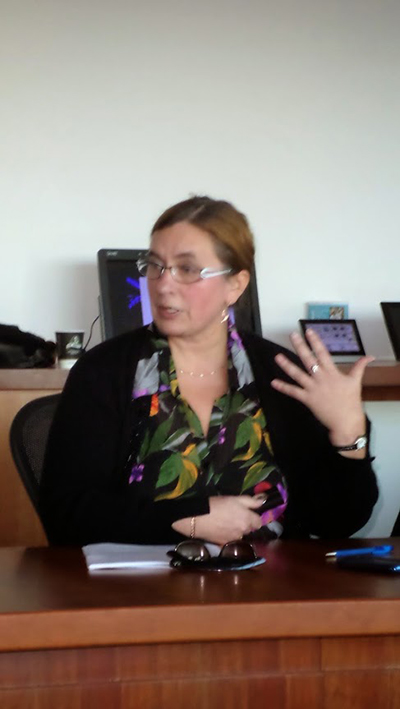 Halyna Mokrushyna. (Photo: Nadia Volguine)Halyna Mokrushyna, part-time professor of sociology at the University of Ottawa, spoke in her presentation about the Donbas region’s identity, about Donbas’ demands to obtain regional autonomy and Kyiv’s stubborn refusal to listen, and about Donbas’ rebellion in the wake of Euromaidan. Based on various sociological data between 2006 and 2014, she showed that Donbas residents are Ukrainian citizens with a strong regional identity that values Russian language, pro-Russian foreign policy orientations and a Soviet interpretation of Ukrainian history. For Donbas residents, an ideal Ukraine is a welfare state which provides social protection for its citizens, which preserves peace and stability, and which is strongly present in the international arena. Civil rights and a feeling of Ukrainian nationalism are at the bottom of the priority list for Donbas residents, as compared to Ukrainians in the West.
Halyna Mokrushyna. (Photo: Nadia Volguine)Halyna Mokrushyna, part-time professor of sociology at the University of Ottawa, spoke in her presentation about the Donbas region’s identity, about Donbas’ demands to obtain regional autonomy and Kyiv’s stubborn refusal to listen, and about Donbas’ rebellion in the wake of Euromaidan. Based on various sociological data between 2006 and 2014, she showed that Donbas residents are Ukrainian citizens with a strong regional identity that values Russian language, pro-Russian foreign policy orientations and a Soviet interpretation of Ukrainian history. For Donbas residents, an ideal Ukraine is a welfare state which provides social protection for its citizens, which preserves peace and stability, and which is strongly present in the international arena. Civil rights and a feeling of Ukrainian nationalism are at the bottom of the priority list for Donbas residents, as compared to Ukrainians in the West.
Donbas did not understand and approve of Euromaidan. Euromaidan destroyed the order and stability thatDonbas people value. Euromaidan was also about nationalist, anti-Russian rhetoric, which Donbas rejects. It is only logical that Donbas rebelled, Mokrushyna said.
From the regional referendum of 1994 to the Russian-sympathetic protests in downtown Donetsk in early March of 2014, Donbas has been demanding more autonomy from the central government in Kyiv, that Russian be an official, second language of Ukraine, and that a close political alliance be maintained with Russia. These demands kept falling on the deaf years in Kyiv regime, no matter who was the President. SoDonbas residents took the initiative in the spring of 2014, inspired by the popular mobilizations ofEuromaidan.
This popular mobilization of Donbas activists occupied administrative buildings and led to the proclamation of the People’s Republic of Donetsk (PRD) in April. Thus was born the Donetsk region insurgency. It was a grassroots movement which reacted to the anti-Russian ideology and actions of the new Ukrainian political rulers who had seized power in Kiev. They refused Donbas a right to hold a referendum, so it went ahead and organized its own, in May. The PRD is an attempt at a new political and social project which reflects the ideas and aspirations of a great part of Donetsk region residents – a socialist welfare state with traditionalist values where all citizens are respected, regardless of their national or religious belonging, and where two official languages – Russian and Ukrainian – are recognized.
Paul Robinson
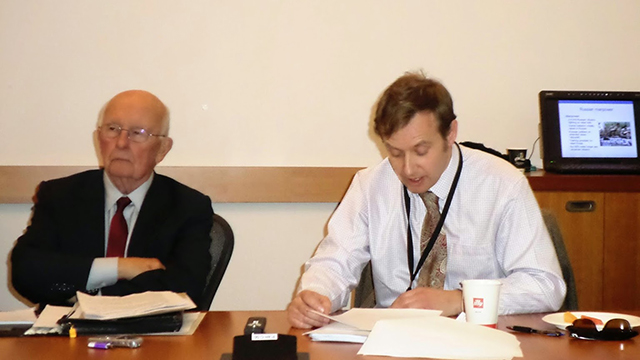 Left: James Bissett; Right: Paul Robinson. (Photo: Nadia Volguine)
Left: James Bissett; Right: Paul Robinson. (Photo: Nadia Volguine)
The second panel of the conference looked at the war in Eastern Ukraine through the geopolitics of the fight for influence in Ukraine. Paul Robinson, Professor at the Graduate School of Public and International Affairs of University of Ottawa and author of numerous books and articles on Russia, examined Russia’s role in the war in Donbas. Contrary to the narrative depicting the Donbas uprising as instigated by Russia, Robinson sees it as a mostly local initiative. The rebel armed forces are not centrally controlled or vertically organized, as one would expect if a single will had created them. Rather, they are horizontally organized, with a whole bunch of different militias that answer only to their immediate commanders. This reflects the way in which they were created – in a largely spontaneous fashion at a local level. The role of Russians in the rebellion is not insubstantial, Robinson said, but he also noted that 90 per cent of the rebel troops are Ukrainian citizens.
Robinson says this is not a war in which Ukrainian and Russian armies are fighting each other. It is a civil conflict in which Ukrainians are fighting Ukrainians. Russian military supplies have mainly taken the form of items which are easily concealed.
The incursion of Russian troops into Ukraine in August, proof of which emerged in late August, was not intended to destroy the Ukrainian Army or even to seize territory, but rather to inflict a sufficiently large defeat on the Ukrainians to make them realize that they could not achieve a decisive military victory. That would force them to come to a negotiating table. Russia has repeatedly said that its objective is not to annex Donbass or to create an independent state there, but rather to have Donbass remain within Ukraine, albeit with greater autonomy.
The strategy has not succeeded, said Robinson. While Russia has prevented Ukraine from defeating the rebellion, it has not been able to convince Kiev to negotiate directly with the rebels or to show any indication of willingness to make major concessions. Thus, Moscow is left with something it didn’t want – a pair of independent republics in Donbas (Donetsk and Luhansk) which lack proper states and which face massive economic and humanitarian problems. Neither Ukraine nor the West is going to help re-establish a functioning state and economy in Donbass, and so provide law and order, jobs, pensions, and security. Only one country has the will and the ability to give the people of Donbas what they need. That country is Russia.
James Bissett
James Bissett, a distinguished Canadian diplomat with a long career of representing Canada abroad, including in the Balkans, talked about NATO and US involvement in the ongoing crisis in Ukraine. He finds the situation in Ukraine to be terribly tragic. He holds the US-led NATO alliance primary responsible for what is happening in Ukraine. This pattern can be seen not only in Ukraine, he said. Regime changes, if not by force, then by bribing and providing NGOs with money to support the US cause, have occurred in Egypt, Iraq and Afghanistan. While it’s the US which has done all of the interventions and the bombings, it is Kaddafi in Libya, Milosevic in the former Yugoslvia and now Putin in Russia who are blamed. Ukrainehas been destroyed, Bisset said. It is not only Eastern Ukraine that probably will never be able to recover economically, it is Ukraine itself. When the Soviet Union collapsed and the Berlin wall fell, the Americans did not offer an iota of help to Russia or the former Soviet republics.
When the Soviet Union collapsed, NATO had to find a reason for existence, and it found it with the breakup of Yugoslavia. In the breach of article One of the NATO treaty stating that the alliance will never use or threaten to use force in the resolution of international disputes and will always act in accordance with the Charter of the United Nations, the US bombed Serbia for 78 days and 78 nights. In addition to that, it broke its promise made to the last premier of the Soviet Union, Mikhail Gorbachev that if the Russians allowed the united Germany into NATO, then NATO would not expand eastward. But NATO proceeded to accept a string of East European countries in the years that followed, including Hungary, Poland, and the Czech Republic.
The great prize for the US is, of course, Ukraine. It did not look like they were going to get it… until the Maidan movement erupted. The US did not instigate the movement. Its origin lay in the frustration of Ukrainian people who saw no hope for their country, and they started protesting. The Americans saw an opportunity and they stepped in.
Ukrainians are a pawn in a much bigger game, says Bissett. The US uses Ukraine in an attempt to prevent Russia from re-emerging as a global power. It will not be President Poroshenko who decides when to stop the fighting; it will be President Obama. And in James Bissett’s opinion, Obama does not care.
Round Table: The Prospects of Reconciliation in Ukraine
During the round table discussion on the possibility of reconciliation in Ukraine, Ivan Katchanovski expressed his opinion that it will be very difficult to reunite Ukraine. Donbas is already de facto separated from Ukraine. A lot will depend on the current Ukrainian government’s ability to govern the rest ofUkraine. The extreme right battalions fighting in Eastern Ukraine could turn their arms against Kyiv and overthrow Poroshenko, as they overthrew Yanukovych. So far, Kyiv has refused to investigate the mass killings that occurred on Maidan Square in February, in Odessa in May and in the war in Donbas. Katchanovski’s research shows that some elements of the self-defense squads and of the militias of the Right Sector fascists orchestrated shootings by snipers on people in Maidan Square. But Kyiv is turning a blind eye to any investigation and the West is not pressuring Kiev to investigate.
Paul Robinson said that a united Ukraine is theoretically possible, but not under the existing order inUkraine. The Donetsk and Luhansk rebels do not want to live under an oligarchic regime. If the “fascist junta,” as the government in Kyiv is called by many, were destroyed, it could be possible. But it is not going to happen. “In reality, we are stuck with these two independent statelets and we will just have to do the best of it. The Kyiv government is not going to negotiate; we cannot make it negotiate and [the West] is not putting any pressure on Kyiv to negotiate. So we are stuck with the worst possible situation.”
James Bissett said that once the killing started, it became very difficult to arrive at a peaceful resolution. A civil war makes everybody a combatant, and atrocities are being committed on both sides. There are historical, cultural, and religious reasons that explain why East and West did not always get along. “I am not very hopeful. It would require someone to come in and declare a cease fire, international observers to ensure that there is actually a cease fire, which has never been ensured in Ukraine. Who will step in? Russia and the US, NATO have their interests in this struggle. Even if it was settled, the bloodshed that has happened will make it extremely difficult for both sides to come together.”
Olga Ostriichuck observed that when we speak about peaceful resolution, we speak of the need for a ceasefire. However, a true reconciliation will require much more than that. A reconciliation will involve a work of memory, a sober look at what happened and an honest effort to establish the truth. It will be a long and painful process. Canada and the international community should initiate a peaceful resolution of the situation in Ukraine, she says.
Halyna Mokrushyna said that the political will to stop this civil war should come from within Ukraineitself. “More and more Ukrainians are realizing that they are fighting against their own people. It is becoming harder and harder for them to explain why they are fighting this absurd war.
“The current government in Kyiv is repeating, like mantra, words about a unitarian Ukraine while ignoring reality. Instead of taking the richness of Ukraine as a multicultural and bilingual country and turning it into an asset, the current Kyiv regime is trying to deny hundreds of years of history and build a mono-ethnic Ukrainian nation which excludes Donbas.
“Donbas reacted to the nationalist rhetoric coming from Maidan. So a national project for Ukraine should reconcile a mono-ethnic Ukraine and multi-ethnic Ukraine, represented by Donbas,” said Halyna Mokrushyna.
You can watch video recordings of many of the presentations to the Dec. 4 seminar in Ottawa here.
A terrifying moment. We appeal for your support.
In the last weeks, we have witnessed an authoritarian assault on communities in Minnesota and across the nation.
The need for truthful, grassroots reporting is urgent at this cataclysmic historical moment. Yet, Trump-aligned billionaires and other allies have taken over many legacy media outlets — the culmination of a decades-long campaign to place control of the narrative into the hands of the political right.
We refuse to let Trump’s blatant propaganda machine go unchecked. Untethered to corporate ownership or advertisers, Truthout remains fearless in our reporting and our determination to use journalism as a tool for justice.
But we need your help just to fund our basic expenses. Over 80 percent of Truthout’s funding comes from small individual donations from our community of readers, and over a third of our total budget is supported by recurring monthly donors.
Truthout has launched a fundraiser to add 460 new monthly donors in the next 8 days. Whether you can make a small monthly donation or a larger one-time gift, Truthout only works with your support.
